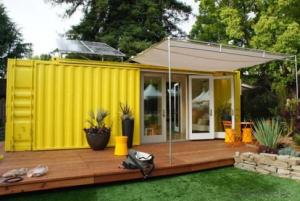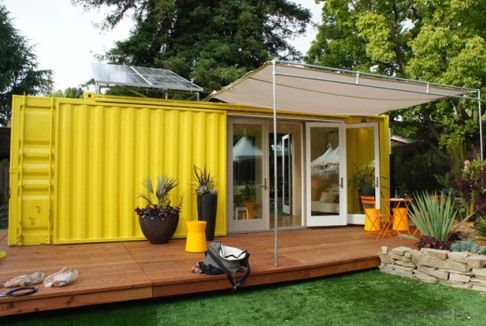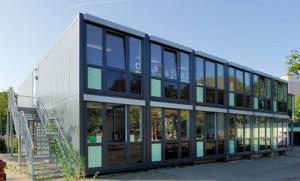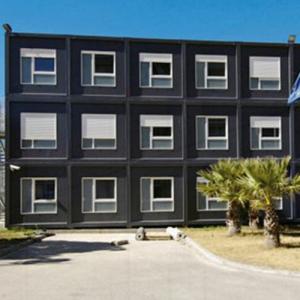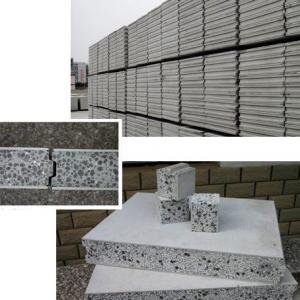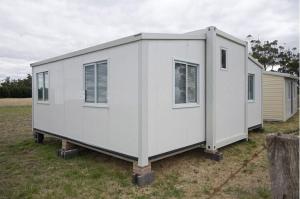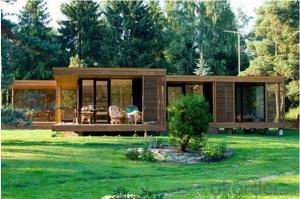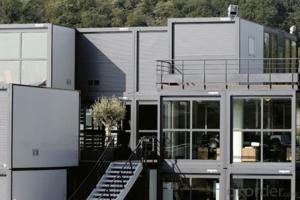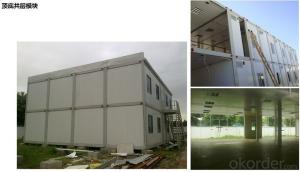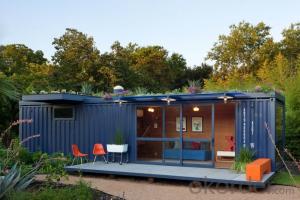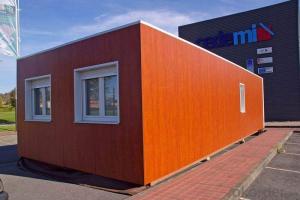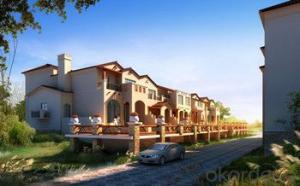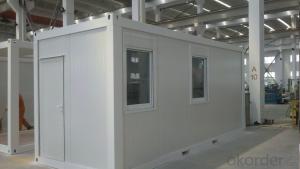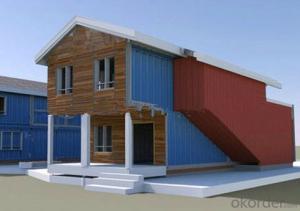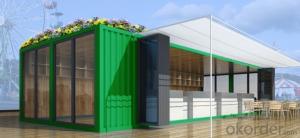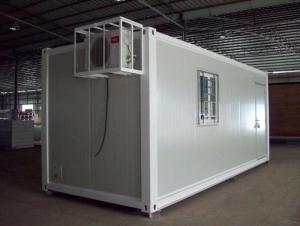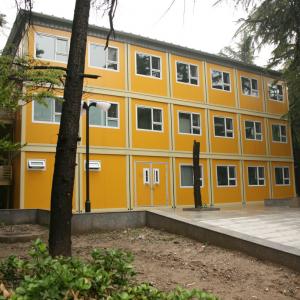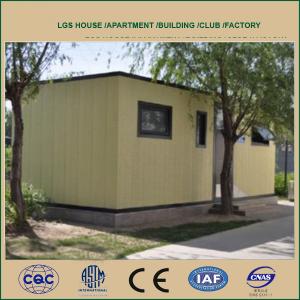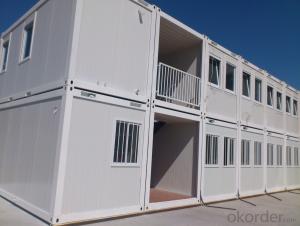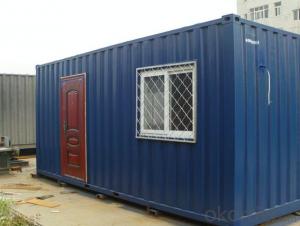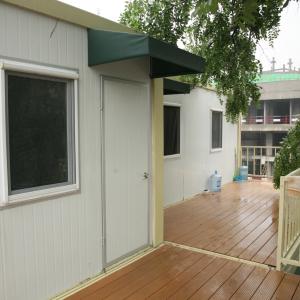Luxury prefabricated container house
OKorder Service Pledge
Quality Product, Order Online Tracking, Timely Delivery
OKorder Financial Service
Credit Rating, Credit Services, Credit Purchasing
You Might Also Like
Specifications
Prefab Container Home:
1. excellent design
2. can be customized
3. ISO9001:2008
4. long availability
Prefab Container Home
We mainly manufacture prefab house, container house, light steel villa, steel structure building, and sentry boxsince 2005.
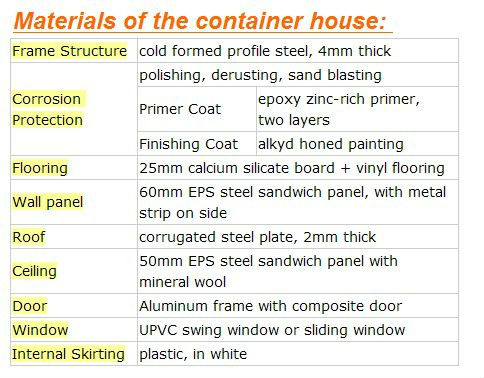
USAGE: mobile living house, mobile office, mobile toilet, dormitory, school etc
- Q: Can container houses be built with a garage or carport?
- Certainly, it is possible to construct container houses with a garage or carport. The modular characteristic of shipping containers enables simple customization and the incorporation of diverse structures. Numerous container house designs incorporate a garage or carport into the overall layout. Depending on the homeowner's preferences and space availability, these structures can either be connected to or separate from the main living area. Opting to build a garage or carport using shipping containers presents numerous advantages, including affordability, resilience, and eco-friendliness, thereby making it a favored choice among enthusiasts of container houses.
- Q: Are container houses suitable for homeless shelters or transitional housing?
- Indeed, container houses can serve as a viable option for homeless shelters or transitional housing. They possess qualities that make them ideal for temporary housing for homeless individuals or families, including cost-effectiveness, ease of transportation, and quick assembly. Designed to be both durable and weather-resistant, container houses ensure the safety and security of their occupants in various climates. Furthermore, these houses can be tailored to include essential amenities such as insulation, plumbing, and electricity, thereby meeting the basic needs of those residing within them. Moreover, container houses contribute to environmental conservation as they repurpose shipping containers, reducing waste and promoting sustainability. By choosing container houses for homeless shelters or transitional housing, individuals can align with responsible construction and resource conservation principles, which are increasingly important in today's environmentally conscious society. Additionally, container houses offer flexibility in terms of scalability, allowing for adjustments to meet the specific needs of the community. They can be stacked or arranged in different configurations to accommodate a larger number of individuals or separated into individual units for families or individuals. However, it is crucial to recognize that container houses should be accompanied by appropriate social services and support systems that address the underlying causes of homelessness and aid in the transition to permanent housing. These services may encompass counseling, employment assistance, and access to healthcare. In conclusion, container houses present a practical and effective solution for homeless shelters or transitional housing. Their affordability, portability, durability, and customizable features make them suitable for providing temporary housing while efforts are made to find permanent solutions for those facing homelessness.
- Q: Are container houses suitable for off-grid living?
- Indeed, container houses prove to be an ideal option for off-grid living. These structures are specifically designed to be self-sufficient and environmentally conscious, making them a commendable choice for individuals seeking an off-grid lifestyle. Container houses can be equipped with solar panels, systems for collecting rainwater, and composting toilets, allowing residents to generate their own electricity, gather and store water, and manage waste without relying on conventional utilities. Moreover, container houses exhibit remarkable durability and the ability to withstand severe weather conditions, rendering them suitable for off-grid locations. By ensuring appropriate insulation and ventilation, container houses can provide a comfortable living space while minimizing energy consumption. All in all, container houses present a sustainable and cost-effective solution for those seeking off-grid living.
- Q: Can container houses be built with a Scandinavian design?
- Yes, container houses can definitely be built with a Scandinavian design. Scandinavian design is known for its simplicity, functionality, and minimalism, which can be easily adapted to container homes. With the right architectural and interior design choices, container houses can incorporate the clean lines, light colors, natural materials, and cozy aesthetics that are characteristic of Scandinavian design.
- Q: Can container houses be designed with hurricane-resistant features?
- Yes, container houses can be designed with hurricane-resistant features. While shipping containers are inherently strong and durable, additional measures can be taken to ensure their ability to withstand hurricane forces. One key aspect of designing a hurricane-resistant container house is reinforcing the structure to resist strong winds. This can involve strengthening the container walls, roof, and floor by adding additional steel beams or braces. By reinforcing the container, it becomes better equipped to handle the high wind pressures during a hurricane. Another important aspect is securing the container house to its foundation. This can be achieved by using strong anchor systems such as concrete footings or helical piles. Properly anchoring the container house will prevent it from being lifted or moved by strong winds, reducing the risk of structural damage. In addition, designing the container house with hurricane-resistant windows and doors is crucial. Impact-resistant windows and doors, made from materials like laminated glass or polycarbonate, can withstand flying debris and pressure differentials caused by hurricanes. These features ensure that the container house remains intact and keeps its occupants safe during a storm. Furthermore, proper insulation and ventilation systems should be integrated into the container house to prevent water infiltration during heavy rainfall associated with hurricanes. Adequate waterproofing measures combined with proper drainage systems will help to mitigate the risk of flooding or water damage. It is important to note that while container houses can be designed with hurricane-resistant features, no structure can be completely hurricane-proof. The severity of a hurricane and its impact on a container house will depend on various factors such as its location, the strength of the storm, and the quality of construction. However, incorporating hurricane-resistant design features greatly enhances the chances of the container house withstanding the forces of a hurricane and protecting its occupants.
- Q: Are container houses resistant to mold or mildew?
- Yes, container houses are generally resistant to mold or mildew. The materials used in constructing container houses, such as steel or aluminum, are not susceptible to moisture absorption and do not provide a suitable environment for mold or mildew growth. Additionally, proper insulation and ventilation systems can be installed to further prevent the development of mold or mildew.
- Q: Are container houses safe and secure?
- Yes, container houses can be safe and secure. When properly designed and constructed, container houses can offer the same level of safety and security as traditional houses. They are built to withstand extreme weather conditions and can be fortified against potential threats. Additionally, container houses can incorporate various safety features such as fire-resistant materials, secure locks, and alarm systems to enhance security.
- Q: Can container houses be designed to be earthquake-resistant?
- Yes, container houses can be designed to be earthquake-resistant. By using proper engineering techniques and incorporating seismic design principles, container houses can be built to withstand seismic forces. This may include reinforcing the structure, using flexible foundation systems, and incorporating dampers or bracing mechanisms to absorb and dissipate earthquake energy.
- Q: Can container houses be built with a rooftop terrace or outdoor seating area?
- Certainly, rooftop terraces or outdoor seating areas can be incorporated into the construction of container houses. In fact, container houses are renowned for their adaptability and capacity for personalization. By carefully organizing and designing the structure, it is possible to create a rooftop terrace or outdoor seating area within a container house. One method to achieve this is by utilizing the rooftop space of the container. This can be accomplished by reinforcing the container's structure and incorporating a staircase or ladder for easy access. With this setup, the rooftop can be transformed into a practical and fashionable terrace or seating area, complete with seating arrangements, greenery, and desired amenities. Furthermore, container houses can also be designed with outdoor seating areas at ground level. This can be achieved by extending the container's structure to establish a covered patio or deck, which can be further enhanced with seating furniture, outdoor lighting, and other decorative elements. It is crucial to note that when planning for a rooftop terrace or outdoor seating area in a container house, it is advisable to seek professional guidance to ensure safety measures and structural integrity. Additionally, compliance with building codes and regulations should be taken into consideration. To conclude, container houses can indeed be constructed with rooftop terraces or outdoor seating areas, enabling individuals to relish outdoor spaces and make the most of the unique advantages provided by container house living.
- Q: Are container houses suitable for mobile clinics or medical facilities?
- Yes, container houses can be suitable for mobile clinics or medical facilities. Due to their modular and portable nature, container houses can be easily transported and set up in various locations, making them ideal for mobile healthcare services. They can be customized to include necessary medical equipment and facilities, ensuring a functional and efficient space for healthcare professionals to provide medical services.
Send your message to us
Luxury prefabricated container house
OKorder Service Pledge
Quality Product, Order Online Tracking, Timely Delivery
OKorder Financial Service
Credit Rating, Credit Services, Credit Purchasing
Similar products
Hot products
Hot Searches
Related keywords
